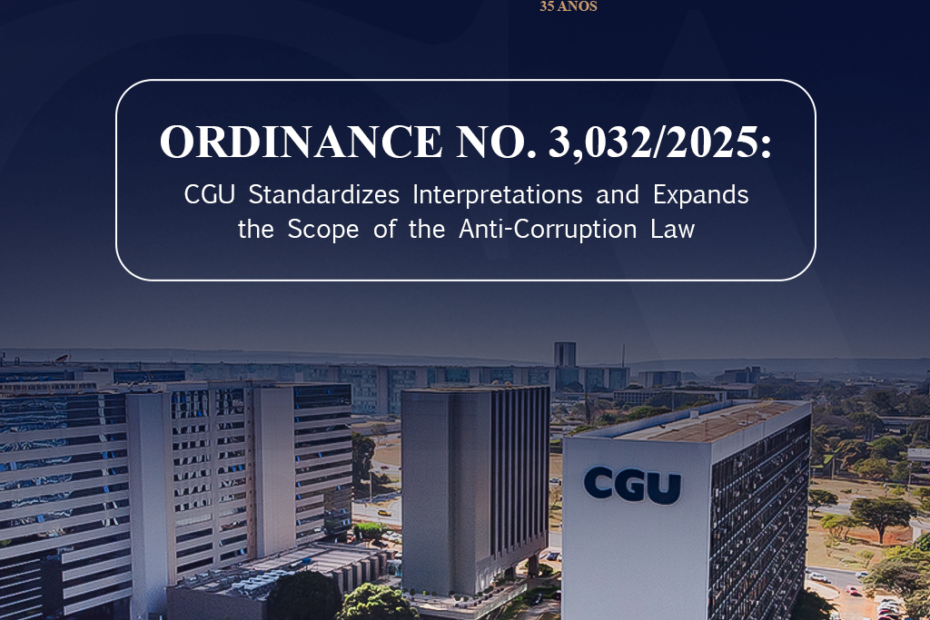On September 10, 2025, Brazil’s Office of the Comptroller General (CGU) published Ordinance No. 3,032, which introduces eight administrative statements aimed at standardizing the interpretation of rules on the administrative liability of legal entities for acts of corruption. The measure seeks to provide greater predictability in the application of Law No. 12,846/2013 (the Anti-Corruption Law) while consolidating a broader and stricter understanding of the circumstances that give rise to liability.
Retroactive Application of Decree No. 11,129/2022
Statement No. 1 establishes that Decree No. 11,129/2022, which regulates the Anti-Corruption Law, applies to all Administrative Accountability Proceedings (PAR) since its entry into force on July 18, 2022. Consequently, even when the acts under investigation occurred before that date, the calculation of fines must follow the criteria set forth in Articles 22 and 23 of the new decree, even if the provisions of the repealed Decree No. 8,420/2015 would be more favorable to the company under investigation.
Expanded Concept of Undue Advantage
Statement No. 2 introduces one of the most significant interpretative changes by broadening the concept of undue advantage under Article 5, Item I, of Law No. 12,846/2013. From now on, undue advantage may include goods, services, or benefits of any nature, whether or not they have direct economic value, encompassing even advantages of a political, moral, or sexual nature.
Liability Without the Need for Specific Intent
Statement No. 3 removes the requirement to prove specific intent (dolo específico) or an actual quid pro quo by the public official. In other words, for administrative liability purposes, it is sufficient that the harmful act was committed by the legal entity, even if no concrete benefit or advantage resulting from the conduct can be proven.
The Public Official’s Demand Does Not Exclude Corporate Liability
According to Statement No. 4, the fact that a public official requests or demands an undue advantage does not exempt the company that offers, promises, or grants it from liability. Thus, the initiative of the public official does not eliminate the unlawfulness of the act committed by the legal entity, which remains subject to the sanctions provided in Law No. 12,846/2013.
Gifts and Hospitality: Parameters and Limits
Statements No. 5 and No. 6 jointly address conduct involving the offering of gifts and the granting of hospitality by legal entities to public officials. The first statement recognizes that no illicit act occurs when gifts or hospitality are offered strictly within the parameters established by law. Statement No. 6, however, sets clear boundaries by declaring that invitations to concerts, sports games, or personal entertainment events exceed the concept of hospitality and constitute a harmful act under the Anti-Corruption Law.
False Documents in Public Bids and Cumulative Sanctions
Statement No. 7 reinforces that presenting false or altered documents in bidding procedures gives rise to administrative liability, regardless of the outcome of the tender.
Statement No. 8 consolidates the understanding that convictions in Administrative Accountability Proceedings (PAR) entail the cumulative application of the penalties provided in Article 6, Items I and II, of Law No. 12,846/2013 — that is, both a fine and the extraordinary publication of the conviction decision. Exceptionally, in cases involving Leniency Agreements or Commitment Terms, only the fine may be applied, without the mandatory publication of the decision.
Conclusion
The publication of Ordinance No. 3,032/2025 reinforces the CGU’s leading role in promoting uniformity and reducing divergences in the application of the Anti- Corruption Law, marking a new phase of broader and stricter interpretation of the administrative liability regime. By adopting wider interpretations of the concepts of harmful acts and undue advantage, the Ordinance heightens the level of rigor and increases companies’ exposure to sanctions, requiring greater attention to compliance with integrity regulations. In this context, it becomes essential for legal entities to reassess their compliance programs, integrity policies, and protocols for interaction with public authorities to prevent potential liability under the new interpretive guidelines. More than ever, compliance with the Anti-Corruption Law depends not only on good intentions but on effective mechanisms of prevention, transparency, and corporate control.


